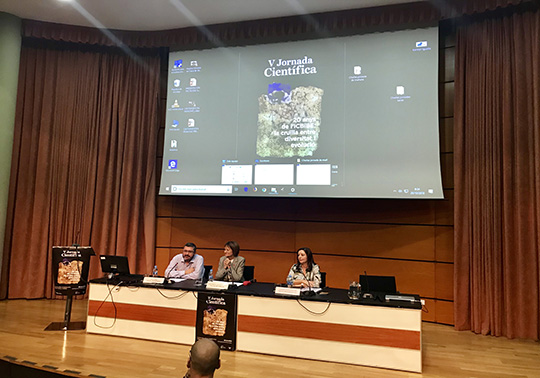Opening ceremony of the 5th Conference of the Cavanilles Institute of Biodiversity and Evolutionary Biology
- Office of the Principal
- October 26th, 2018

Titled “20 years of the Cavanilles Institute for Biodiversity and Evolutionary Biology (ICBiBE): the crossroads between diversity and evolution”, the 5th Scientific Conference was inaugurated at the Auditorium of the Botanic Garden of the University of Valencia.
The rector of the University, Mª Vicenta Mestre, chaired the opening along with the director of ICBiBE, Juan Monros, and the coordinator of this 5th Scientific Conference, Mª José Carmona.
In her speech, rector Mª Vicenta Mestre, has put great value in the role of this type of conference, which helps in the exchange of ideas among experts from different countries. "If we only do science, without disclosure, we do not fulfill one of the visions of the University, as is the transfer of knowledge," outlined Mª Vicenta Mestre.
The director of the ICBiBE of the University of Valencia, Juan Monros, said that there is working being done to provide new ways of collaboration between the Institute and other universities and international centers. He also reminded everyone that “the horizon that must guide us is in the research for scientific excellence, in order to be able to continue growing and rising”.
The coordinator of the 5th Scientific Conference, Mª José Carmona, highlighted the motto of these days, diversity and evolution, “ideas that are the essence of ICBiBE”. Carmona wished that these days remain very productive and memorable within the 20th anniversary of the Institute.
The Cavanilles Institute for Biodiversity and Evolutionary Biology was founded by the University of Valencia in 1998 with the mission of carrying out fundamental and applied research, training of researchers, and services and assistance to society in the fields of biodiversity and evolutionary biology. The Institute emphasizes an integrative and multidisciplinary approach.
The strongest aspect lies in its ability to approach virtually any question related to biodiversity and biological evolution from multiple facets, studying from morphology to animal behavior, from molecular genetic variation to quantitative, integrating theories and methods of complementary areas such as molecular biology, genetics, population biology, paleontology, taxonomy, ecology, neurobiology or ethology. The Institute can apply this capacity to studies on the main groups of living beings, from viruses and bacteria to vertebrate animals and higher plants, as well as to their biological interactions.




















